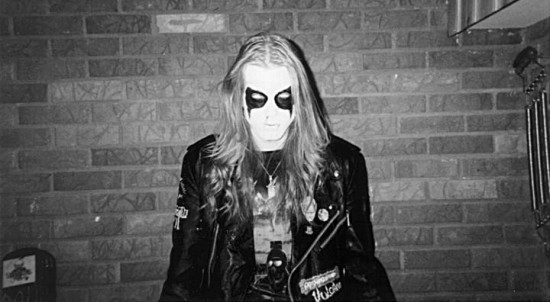Movie Review: Until The Light Takes Us

First off, a word of warning: Until The Light Takes Us focuses on the Norwegian black metal scene that developed during the early '90s, and doesn’t really provide a concise history of the genre. This is not Black Metal 101, seeing as there is almost no coverage of black metal prior to or outside of that movement. If you’re peripherally familiar with the music and subculture, however, this film will flesh out the facts with some interesting personal perspectives which novices and diehard fans alike will very much enjoy.
There is no narration in the film, so no overarching discussion linking together the various interviews and exchanges; it is shaped only by its editing, which is fittingly spare. The film centers around duelling interviews with everyone’s favorite brilliant murderous fascist, Varg Vikernes (Burzum, Mayhem), and the reactionary, apolitical Fenriz (Darkthrone), with additional input from other players in the scene. Through those two main perspectives, the birth of the Norwegian black metal scene, its sudden exposure in the media, and subsequent popularization is explored, but a multiplicity of subjective experiences ultimately do not add up to an objective truth.

Case in point, the film’s discussion of Euronymous’ murder. By allowing the story to be told by Vikernes almost exclusively, the film is slaved to the perspective of the murderer, and it was here that the would have benefitted from more contribution from other sources, since Vikernes’ version (“Euronymous was telling everyone he was gonna kidnap and kill me, so I went to his place and ended up killing him since I thought he was gonna kill me first”) leaves a little to be desired. So why did he kill him? I doubt we’ll ever really know, though there are many reasons that have been commonly bandied about, the most amusing being that Euronymous, as a committed Satanist, and Vikernes, a proponent of Paganism and traditional Norse mythology, fought to the death over ideology, and another (the most plausible) being that Vikernes killed Euronymous for financial/contractual reasons, much in the same way that the East Coast/West Coast rap rivalry in America took so many lives.
That said, the “hands off” perspective taken by the film is a strength overall, particularly in its almost peripheral coverage of the racist undercurrents of black metal and its proponents. I say this not because the xenophobic philosophies of the scene aren’t troubling, but because no matter how problematic, they cannot be removed from the genre, and as such, to properly investigate them would require an entirely different film. This is not a film about the overt violence, inherent racism and rebellion against Judeo-Christian values endemic to the genre. At its heart, it is about a group of kids who decided to create a style of music that tapped into the deep, dark underbelly of their local culture, the factions within the group that decided to exercise the antisocial messages of that music on the culture itself, and finally what happened when the proverbial shit hit the fan and thrust this small movement into the mainstream consciousness.
This is a clever, restrained film, shot in a stark style fitting to its subject matter, that would likely also benefit from repeated viewings. It’s showing every night at 9:30 at Cinema du Parc until April 1st, so grab it before it’s gone… you won’t be sorry.



